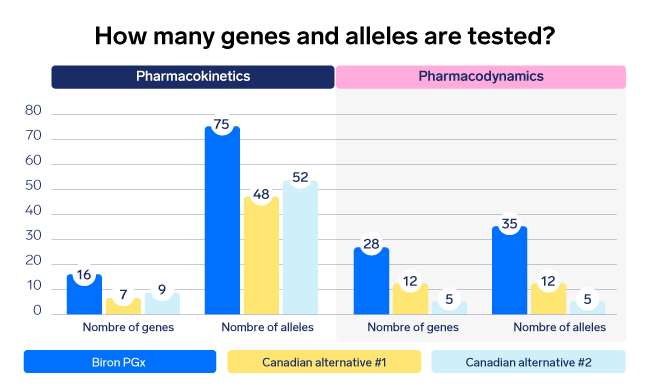
Pharmacogenomics (PGx) for doctors and other healthcare professionals
Make choices guided by genetics and reduce medication trial and error.
The Biron pharmacogenomic test analyzes genetic variants that influence the effects of medications used for mental health problems, ADHD and pain management.
This DNA test enables you to personalize choices and dosages of over 140 molecules according to the patient’s genetic results.
Accreditations and certifications
Our laboratory is CAP certified – College of American Pathologists

Our systems are Soc2 Type II accredited

Who can prescribe and benefit from PGx testing?
Who can prescribe and benefit from PGx testing?
- General practitioners and specialists
- Pharmacists
- Nurse practitioners
Why prescribe a pharmacogenomic test for your patient?
Your patients’ well-being is important, but the road to recovery can be hindered by a lengthy trial and error process not tailored to your patients’ individual characteristics [1]. The pharmacogenomic test enables you to make more informed decisions.
Using a pharmacogenomic test helps to reduce the incidence of adverse reactions of medications and increase the efficacy of treatments. [2,3]
Pharmacogenomic testing is recommended by CANMAT in cases of suboptimal response to an initial antidepressant.
Pharmacogenomic testing (PGx) – a major asset for your practice
Reduces the prescription of ineffective treatments
Guides your treatment choices
Identifies predispositions to side effects
Helps in managing complex cases
What genes are tested in the Biron pharmacogenomic test?
The Biron PGx test identifies common and rare genetic variants across multiple ethnic backgrounds, increasing the chance of obtaining clinically relevant patient data.

What medications are covered by the Biron PGx test?
See the list of 145 medications covered by our pharmacogenomic tests here.
Pharmacogenomic test report – an essential, clinically validated tool
- Reviewed clinical guidelines. We reference and integrate all peer-reviewed clinical guidelines in the report.
- Co-created with psychiatrists. We co-created the report with psychiatrists to offer an intuitive format that breaks down your patient’s predispositions to medication effects into three categories: 1) Exposure, 2) Efficacy, 3) Adverse drug reactions.
- Fewer false negatives. We provide the most comprehensive list of pharmacokinetic and pharmacodynamic variants in Canada in order to offer fewer false negative results than other pharmacogenomic tests for mental health problems and pain management.
- All alleles are tested. We test all key alleles identified in the “Minimum, evidence-based genetic testing panel” for psychiatry and recommended by the Association of Molecular Pathology (AMP, Tier 1).
- Recommendations based on clinical evidence. Our pharmacogenomic recommendations are provided using an open and peer-reviewed approach that ensures transparency.
How to prescribe a pharmacogenomic test to a patient
Fill in the requisition and give it to your patient.
Patients can order their test kit online, or you can offer them the option of picking it up at your clinic. Contact us for this option.
The patient takes a saliva sample according to the instructions in the kit. They send the sample, requisition and consent form (if applicable) by mail, using the envelope provided.
An email notification is sent as soon as the results are ready (roughly five working days after receipt of the sample). You can view the report directly on the Biron portal. The patient also has access to their results on the portal.
Resources for healthcare professionals
Here are some online resources to support your practice, from prescribing the test to interpreting the report.
Scientific publications and resources
- Evidence-based pharmacogenomic testing for psychiatry and pain management.
- Canadian Network for Mood and Anxiety Treatments (CANMAT) 2023 Update on Clinical Guidelines for Management of Major Depressive Disorder in Adults
- Pharmacogenomic Testing of Complex Psychiatric Cases, including Those with ADHD and Comorbid Conditions, Reveals an Increased Frequency of Abnormal Metabolic Phenotypes, Compared to the General Population.
To learn more about pharmacogenomic testing, contact the Biron Genetics team.
FAQ
Find the answers to your questions in our FAQ section or write to us at genetique@biron.com for any other question.
Sources3
- Van Schaik RHN, Müller DJ, Serretti A and Ingelman-Sundberg M. (2020) Pharmacogenetics in Psychiatry: An Update on Clinical Usability. Front Pharmacol 11:575530.
- Brown et al. (2022) Clin Pharmacol Ther 112(6):1303-1317.
- Trivedi et al. (2006) Am J Psych 163, 28-40.
